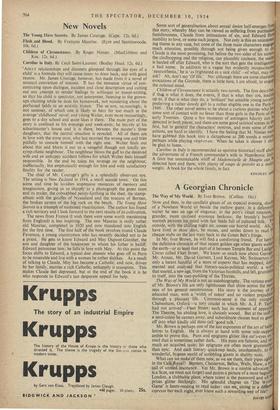New Novels
The Young Have Secrets. By James Courage. (Cape. 12s. 6d.) Flesh and Blood. By Francois Mauriac. (Eyre and Spottiswoode.
10s. 6d.) • Caroline in Italy. By Cecil Saint-Laurent. (Bodley Head. 12s. 6d.)
'ADULT relationships and disasters glimpsed through the eyes of a child' is a formula that will cause many to draw back, and with good reason. Mr. James Courage, however, has made from it a novel of unusual conviction of interest. It has the immense virtue of con- centrating upon dialogue, incident and close description and cutting out any attempt to render feelings by soliloquy or mood-writing, so that his child is spectator, not interpreter, listening to the grown- ups chatting while he does his homework, not wandering about the perfumed fields in an ecstatic trance. The se:- son, reassuringly, is not summer, of which one is likely to hear far too much in the average 'childhood' novel, and young Walter, even more reassuringly, goes to a day school and quite likes it there. The main part of the story is confined to his evenings and week-ends; he boards at his schoolmaster's house and it is there, between the master's three daughters, that the central situation is revealed. All of them are in love with the same man, who has married the wrong one and tries pitifully to console himself with the right one. Walter finds out about this and blurts it out to a vengeful though not totally un- sympathetic neighbour. The neighbour blows the gaff to.the deceived wife and an unhappy accident follows for which Walter feels himself responsible, In the end he takes his revenge on the neighbour, ineffectually, but emphatically enough for him and with satisfactory finality for the reader.
The chief of Mr. Courage's gifts is a splendidly observant eye. The setting is New Zealand in 1914, a small seaside town. On this scene and time he lavishes impressive resources of memory and imagination, giving us as sharply as a photograph the green tram and its trailer, the cobwebbed penny-farthing in the shed, the stamp- album with the giraffes of Nyasaland and the toucans of Borneo, the broken cavern of the big rock on the beach. The Young Have Secrets is a triumph of sustained visualisation. The author has found a rich territory and I look forward to the next results of its cultivation.
The news from France (I wish there were some worth mentioning from England) is less inspiring. The new Mauriac is really rather old Mauriac, completed in 1920 and now translated into English for the first time. The first half of the book revolves round Claude Favereau, a young countryman who has recently decided not to be a priest. He gets to know Edward and May Dupont-Gunther, the son and daughter of the landowner to whom his father is bailiff. Edward patronises him; he falls in love with May. At this point the focus shifts to Edward, a typical ame damnee who goes off to Paris to be miserable and live with a woman he rather dislikes. As a result of talking to Claude, May ' has become a Catholic; and now, driven by her family, marries a rich Catholic, unhappily it transpires. This makes Claude feel depressed, but at the end of the book it is he who responds to Edward's last desperate appeal for help. Some sort of generalisation about sexual desire half-emerges 110.1111 this story, whereby May can be viewed as suffering from puritanic' fastidiousness, Claude from intimations of sin, and Edward fro° inability to love, or some such jargon. Not only is this an uninterest' ing theme in any case, but none of the three main characters engage' much attention, possibly through not being given enough to (1° Claude is the most promising, but before the two sides of his nature, the clodhopping and the religiose, can plausibly coalesce, the reacie.1 is hauled off after Edward, who is the sort that gets the intelligent a bad name. In addition to a vague but evidently incapacitating 'neurasthenia,' he is 'as frightened as a sick child'—of what, may Ong ask? Ah, don't say 'Of life.' No: although there are some charrnin evocations of the Gironde, there is little here, I am afraid, to engagt the rational mind.
Children of Circumstance is actually two novels. The first describes' if that is what it does, the events, if that is what they are, leadinli.. up to, if that is what they do, a 'brilliant' but amiable young nove1a! preferring a rather dowdy girl to a rather eligible one in the Paris 01 1949. The other novel seems to be about a curious painter who haS some sort of contact with no fewer than three girls in the Paris of th° early Twenties. Quite a few moments of astringent hilarity can 14 detected in both pieces, and there are some good satirical scenes in th! first, but in general the characters' motives, and even some of thel; actions, are hard to identify. I have the feeling that M. Nimier tre'' have gabbled this book into a dictaphone at 200 words a mina; perhaps while playing vingt-et-un. When he takes it slower 1 slao be glad to listen. Caroline in Italy is recommended as sportive historical stuff aboul the adventures of a French commander's wife in Napoleonic A faint but unmistakable whiff of Mademoiselle de Maupin can b4 detected here and there, with plenty of coups de pistolet as a matte' weight. A book for the whole family, in fact. KINGSLEY AMII








































 Previous page
Previous page